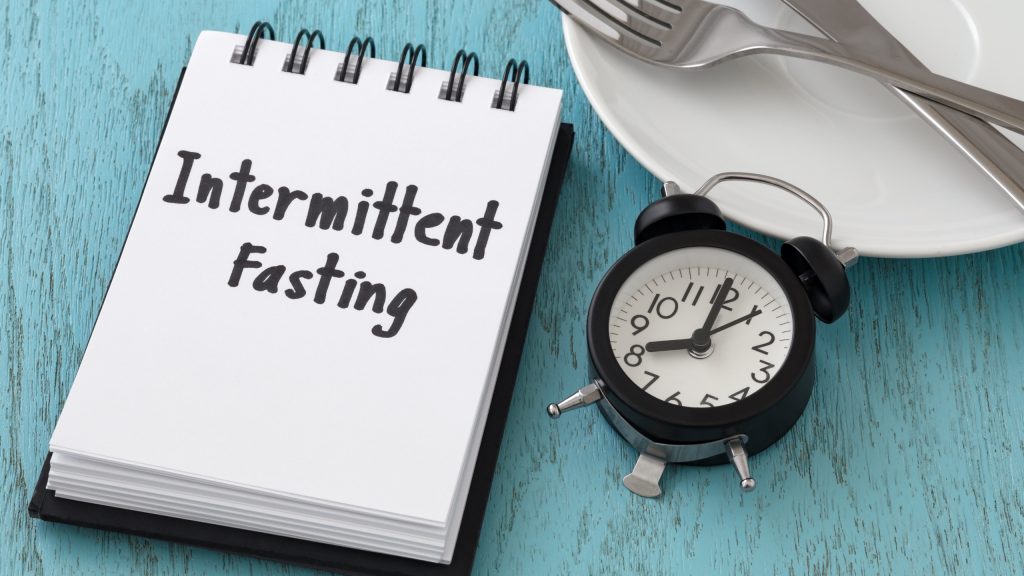Intermittent fasting touts benefits to gut health, detoxification, weight loss and cellular health. Learn more about the research with this blog!
Finding the right diet that’s suitable for you is challenging, especially with an overwhelming amount of choices on the market right now. One of the more popular trends is intermittent fasting, as research has shown this to be beneficial for various aspects of health. For those looking for a diet to help with gut health, SIBO, or cellular health, this could be a viable choice for you. Keep reading to learn more about intermittent fasting, its health benefits, and how to incorporate it into your daily routine!

What is Fasting?
Fasting is not a new concept. Think about our ancestors and their need to be hunter-gatherers in order to eat and survive; they would gorge themselves for days and then have periods of fasting while they hunted again. In addition, fasting has a purpose built on both cultural and religious practices that are still observed in some countries today.
Fast forward to the 21st century, and we find that our emphasis on dieting has become an American obsession. While there have been dozens of fad diets over the years, not many survived the test of time. Plus, new research continues to emerge that changes how we view diets and health. For example, I have told patients for years to eat 3 meals a day and 2 snacks. While this information was correct at the time, I may have been wrong due to emerging research. Recently, there has been a focus on intermittent fasting within the research and nutrition worlds — and for good reason! This practice touts gut health, detoxification, weight loss and cellular health benefits, all of which are positive things. Dr. Dan Pompa has taught his theory on intermittent fasting for years, and now solid research is being published to give proof on this subject.

Relationship Between BMI and Intermittent Fasting
A recent study published by Kahleova and colleagues investigated 50,660 adult members from Seventh-day Adventist churches in the United States and Canada. The results showed that eating one or two meals daily was associated with a lower body mass index (BMI), as compared with three meals daily. They also found a positive relationship between the number of meals and snacks (more than three daily) and increases in BMI. Interestingly enough was the change in BMI related to the length of the overnight fast. It seemed that the longer the overnight fast, the lower the BMI. Their hypothesis suggests fasting has an effect on satiety hormones (leptin or ghrelin). So, how can we begin to compare older studies that showed a strong association with meal frequency and positive weight changes? The answer is that they can’t fully be compared without doing a controlled, head to head study comparing the two methods for weight loss. For now, our suggestion is to eat within a 12-hour window daily and give your body a 12-hour fast overnight. Most research promotes only an 8-hour eating window for intermittent fasting but, for most families and individuals, this time restriction may not be feasible.

What are the Health Benefits of Intermittent Fasting?
One important benefit of a longer overnight fast is the enhancement of the migrating motor complex (MMC), which is found in the small intestine. This critical activity consists of three phases occurring over a period of 85–115 minutes. It has been described as the “intestinal housekeeper” that cleans leftover food particles, bacterial and fungal organisms from the stomach through the small intestine and into the colon. This process is vital to keeping bacteria and fungus (residing in the large intestine or colon) out of the small intestine. Both the small and the large intestines have their own microbiome necessary for the appropriate functions for each area. As you can imagine, the fasting interval overnight gives the body the chance to “clean out” the small intestine in preparation for the following day. If the MMC is not functioning properly, then a slower transit time can result in stasis of the food leading to problems such as small intestinal bacterial overgrowth (SIBO), small intestinal fungal overgrowth (SIFO), chronic inflammation and constipation. Learn more about how intermittent fasting can help these issues here.

Tips to Get Started
If you want to get started with intermittent fasting, here are some helpful tips:
- Eat within a 12-hour window daily (or 8-hour window, if possible)
- Give your body a 12-hour fast overnight
- Add more vegetables to your diet
- Reduce salt and sugar intake
- Drink more clean water
- Get 7-9 consistent hours of sleep a night
- Exercise approximately 30 minutes a day (not necessary, but helps with metabolism)
- Make an eating schedule to stay organized
- Create a routine
For more information on how to boost your health in a holistic and natural way, check out these other blogs:
How to Boost Your Immune System
Buyer Beware: Not All Supplement are Created Equal
The Power of Eating Hygiene
Toxic Burdens: What They Are and How to Avoid Them
References:
https://www.ncbi.nlm.nih.gov/pmc/articles/PMC6520689/
https://www.ncbi.nlm.nih.gov/pubmed/28701389
https://www.ncbi.nlm.nih.gov/pubmed/24739093
https://www.sciencedirect.com/topics/medicine-and-dentistry/migrating-motor-complex

